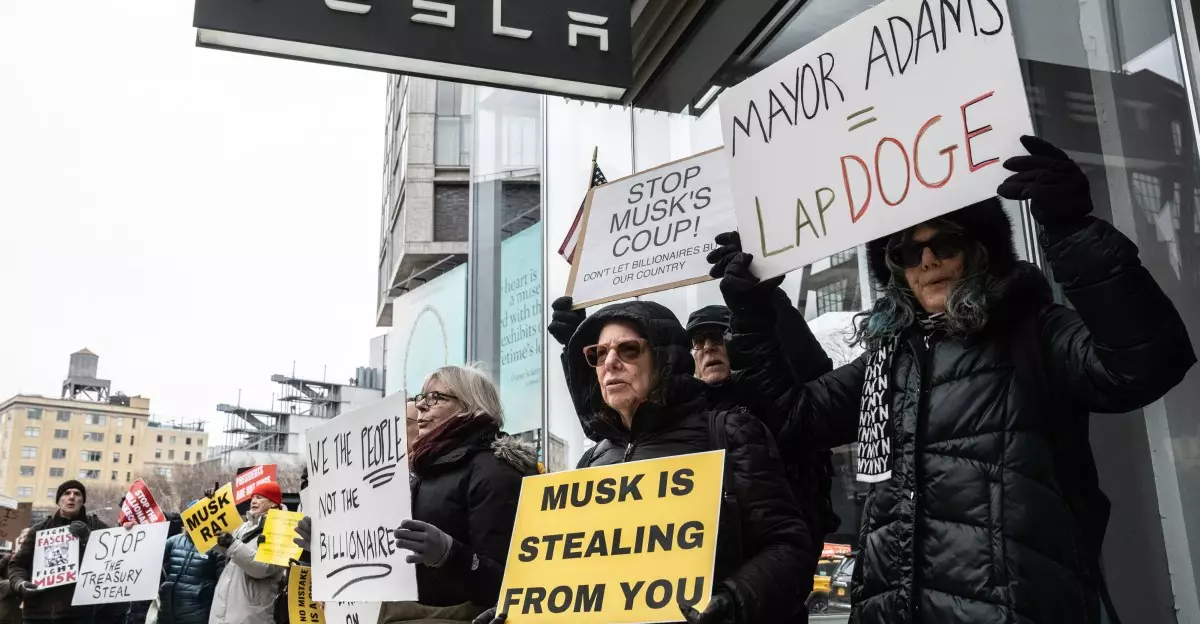In an unprecedented wave of demonstrations, protestors have been gathered outside Tesla showrooms across the United States. This marks the second consecutive weekend of protests spurred by the burgeoning #TeslaTakeover movement, gaining traction on platforms such as Twitter and Bluesky. The protests have attracted attention not merely due to their location—ranging from major cities like New York to more obscure suburbs like Golden Valley, Minnesota—but also because they reflect a growing discontent with the company’s CEO, Elon Musk, and his controversial political affiliations since Donald Trump’s presidency.
While the protests may not have drawn massive crowds, their sheer geographical spread highlights a notable grassroots rejection of Musk’s influence. Organizers have utilized platforms like Action Network to strategize demonstrations in various states, including Ohio, Florida, and even a location in Alberta, Canada. Companies like Tesla, which thrive on a strong public image, may find the implications of these protests concerning, especially given the vocal criticism from both the public and within the company.
The protests come at a time when Tesla investors are increasingly alarmed by Musk’s divisive actions. Reports have indicated that since Trump’s inauguration, Tesla’s stock price has plummeted by a staggering 21 percent, raising questions about Musk’s dual role as a business leader and a political figure. This precarious position has reportedly led to discussions among employees and senior staff suggesting that the company could be more prosperous without Musk at the helm. These discussions, as noted by The Washington Post, buttress the argument that Musk’s political controversies could be eclipsing the company’s innovative potential.
Such internal dissent serves as a vital indicator of the overarching sentiment affecting Tesla’s workplace culture. It is crucial for organizations to maintain a harmonious blend of leadership vision and employee satisfaction, yet Musk’s public persona seems to be undermining both. As protests escalate, there is a palpable sense of urgency for Tesla and its stakeholders to address these concerns openly, lest they further alienate investors and employees alike.
Chants of Dismay: A Direct Reproach
One highlight of today’s protests occurred outside the Tesla showroom in Manhattan, where demonstrators raised pointed slogans. Chants such as “Don’t buy swasticars” and “Elon Musk can go to Mars; we don’t need your Nazi cars” indicate a direct reproach towards Musk’s political leanings and perceived connections with far-right movements. These provocative statements encapsulate the emotions of protestors who feel compelled to stand against what they consider divisive ideologies perpetuated by a powerful corporate figure.
This rally in Manhattan was not an isolated incident; protests unfolded in cities like Austin, Seattle, and Boston amid varying local attendance. Conversely, some locations saw markedly less engagement, such as a solitary protestor in Baltimore who stood outside a showroom. The disparity in turnout serves to highlight the unpredictable nature of public sentiments and the challenges the protestors face in galvanizing a larger movement.
The protests have also caught the attention of celebrities who are leveraging their platforms to amplify the movement. Alex Winter, an actor and progressive activist, actively promoted the protests and was seen engaging directly with activist efforts in Pasadena, California. His involvement has helped to rally support and ignite conversations surrounding consumer responsibility, especially in light of statements encouraging individuals to consider selling their Teslas in protest against Musk’s political actions.
Additionally, musician Sheryl Crow contributed to the discourse through social media, posting a video of a Tesla truck being driven away, accompanied by a message about aligning personal values with consumer choices. Crow’s public declaration resonates with many consumers who may feel conflicted about their support for Tesla when considering Musk’s controversial statements and affiliations.
The Road Ahead: What Lies Beyond Protests
As plans for future protests continue to materialize, including those scheduled for the upcoming President’s Day holiday, it becomes imperative to examine what these movements signify for the future of Tesla and its leadership. The ongoing discontent, both externally in the form of protests and internally within the company, poses a serious challenge to Tesla’s ethos and market stability.
While these demonstrations represent a growing dissatisfaction with leadership in the tech arena, they may also catalyze broader discussions about corporate governance and accountability in business. As consumers, investors, and employees increasingly demand alignment between corporate practices and values, the spotlight remains firmly on Tesla to redefine its relationship with both its products and its leadership. The unfolding narrative will ultimately shape Tesla’s standing in an evolving marketplace, where public perception has never been more vital.


Leave a Reply